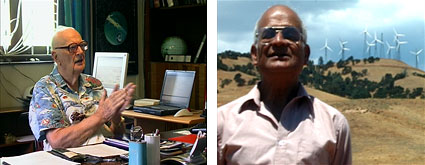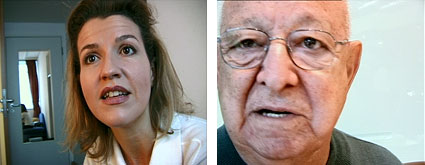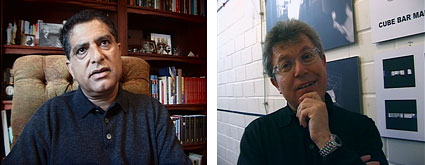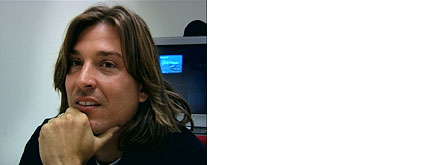Invasion of the Ideas
Summary

Left: Arthur C. Clarke
Right: Dr. Amit Goswami
Where do ideas come from? Since the muse was a child, ideas have fascinated philosophers, artists, scientists and spiritual thinkers. Despite the enormous meaning that ideas have for all human endeavour we know rather little about what stimulates ideas and what motivates the inventor, the musician, the writer, the architect and the filmmaker to transform their ideas into creative work. What are the creative stimuli of ideas, what are the beta-blockers of ideas, and how can we protect the idea against ideakillers?
Filmmaker Hermann Vaske invites you to a surprising encounter with that unknown being called idea. Everybody knows about ideas but to get a grip on them is a Sisyphean task. In order to get closer to them, Vaske has interviewed a number of top scientists and artists of the different creative disciplines. He succeeded in creating an enjoyable and stimulating discovery journey combining people’s meandering walk of personal stories and thoughts with a fast cut montage of their work samples.

Left: Anne-Sophie Mutter
Right: Angelo Dundee
What exactly happens when the spark of inspiration hits us? The Brazilian director Fernando Meirelles (“City of God”) tells us about the aha-effect he had shooting “The Constant Gardener”, “The ideas just come up like this: ‘bang!’ Usually I think about the solution for some problem.”
For composer Hans Zimmer it is a spiritual process, “I intellectualize everything, think about everything and write long, horrible stuff. I mean things, notes that are meaningless. And then there is a moment, where I am not really present anymore. And suddenly I see a piece of music. Somehow, it is a spiritual process.”
Director Joe Pytka shares the same experience, “You can’t tell me the idea comes from you, it comes to you.” His colleague Quentin Tarantino agrees, “If I have a single ability to do things, then it is because it was given to me by somebody before I was born. It is an enormously great gift. But we only deserve it, when we do something with it.”

Left: Dr. Deepak Chopra
Right: Daniel Libeskind
Architect Daniel Libeskind describes the birth of an idea as an act of cosmic dimension, “Well, I think you have to be struck by an idea. It is kind of not one’s own idea even, it is something that hits you, sort of like a meteor falling on top of your head.”
“Everything we can’t conclude really appears metaphysical to us, as if someone from the outside could give you the idea as a gift. The gifts of the gods for instance. Even in the “Iliad” by Homer the ideas and orders came from outside.” comments brain scientist Prof. Wolf Singer of the Max-Planck-Institute.
Ideas are not the property of so-called artists but they are the property of the individual. “My grandfather”, says Björk, “showed me a photograph of a fireplace that he had done. And he was as proud as I am doing a song.” Singer and multimedia artist Peter Gabriel suggests an experiment in order to prove that everybody is creative. “You can give a pill to anyone in the street and you tell them in twelve months time they gonna die unless they create some good art. If their survival is really dependant on being creative, then they’ll find a way to become an artist. So that’s the first thing I think about talent. The second thing is art, music, these are just languages, and nobody thinks ‘Oh, I can’t learn that language!'”

Alex Bogusky
He gets scientific support from Prof. Dr. Fred Alan Wolf of Berkeley University, California. “You can’t help but have ideas. It’s a natural process of just being alive.” “Without art and ideas the world would be a hostile place,” concludes Academy Award winning director Stephen Soderbergh. Dr. Stuart Hameroff from the University of Arizona claims that also athletes have ideas, “One great idea was Mohammed Ali who thought up the concept of what was called ‘rope-a-dope’. That was the opposite of intuitive. I still remember watching him on TV doing that, and I thought to myself, ‘What the hell is he doing?'”And his trainer, Angelo Dundee, agrees: “He came up with the idea of laying on a rope and make George Foreman miss his punches and then take over.”
“While the space, in which people move gets bigger and boundaries disappear, their ideas grow,” concludes visionary humanist Dr. Deepak Chopra, “ideas increase as time goes by. And that is because experience increases as time goes by, new technologies emerge, new relationships arise, cultures amalgamate with each other, old paradigms are broken. So, there’s always an increase, a proliferation of ideas with time. So, we have many more ideas today in the collective belt of consciousness than ever before. And what will happen in a few generations is even beyond our imagination.”
Nothing is so powerful as an idea whose time has come. As Victor Hugo once said: “A stand can be made against an invasion by an army. No stand can be made against an invasion by an idea.”
Long live the idea!
Project Credits
A Hermann Vaske Film
Produced by Hermann Vaske’s Emotional Network in cooperation with ZDF/Arte
- Director and Writer:
- Hermann Vaske
- Commissioning Editor:
- Sabine Bubeck-Paaz
- Producer:
- Hermann Vaske
- Production Coordinator:
- Jennifer Feist
- Camera:
- Isabelle Furrer, Tom Fritzsche, Boris Becker
- Editor:
- Bastian Ahrens
- Postproduction:
- Oliver Kähler, Frank Ott
- Production Assistants:
- Timo Breidenbruch, Kristofer Koch
Germany 2006, 98 min.